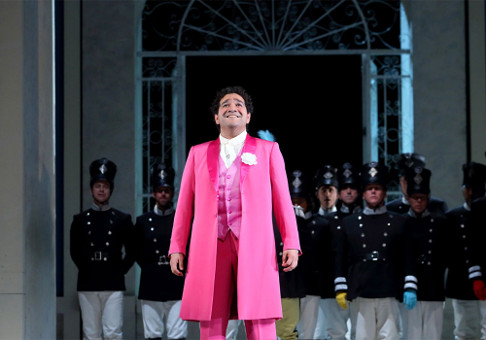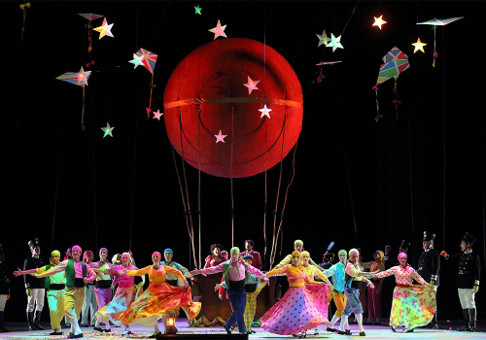Recently in Performances
English Touring Opera are delighted to announce a season of lyric monodramas to tour nationally from October to December. The season features music for solo singer and piano by Argento, Britten, Tippett and Shostakovich with a bold and inventive approach to making opera during social distancing.
This tenth of ten Live from London concerts was in fact a recorded live performance from California. It was no less enjoyable for that, and it was also uplifting to learn that this wasn’t in fact the ‘last’ LfL event that we will be able to enjoy, courtesy of VOCES8 and their fellow vocal ensembles (more below …).
Ever since Wigmore Hall announced their superb series of autumn concerts, all streamed live and available free of charge, I’d been looking forward to this song recital by Ian Bostridge and Imogen Cooper.
Although Stile Antico’s programme article for their Live from London recital introduced their selection from the many treasures of the English Renaissance in the context of the theological debates and upheavals of the Tudor and Elizabethan years, their performance was more evocative of private chamber music than of public liturgy.
Evidently, face masks don’t stifle appreciative “Bravo!”s. And, reducing audience numbers doesn’t lower the volume of such acclamations. For, the audience at Wigmore Hall gave soprano Elizabeth Llewellyn and pianist Simon Lepper a greatly deserved warm reception and hearty response following this lunchtime recital of late-Romantic song.
For this week’s Live from London vocal recital we moved from the home of VOCES8, St Anne and St Agnes in the City of London, to Kings Place, where The Sixteen - who have been associate artists at the venue for some time - presented a programme of music and words bound together by the theme of ‘reflection’.
'Such is your divine Disposation that both you excellently understand, and royally entertaine the Exercise of Musicke.’
‘And there was war in heaven: Michael and his angels fought against the dragon; and the dragon fought and his angels, And prevailed not; neither was their place found any more in heaven … that old serpent … Satan, which deceiveth the whole world: he was cast out into the earth, and his angels were cast out with him.’
There was never any doubt that the fifth of the twelve Met Stars Live in Concert broadcasts was going to be a palpably intense and vivid event, as well as a musically stunning and theatrically enervating experience.
‘Love’ was the theme for this Live from London performance by Apollo5. Given the complexity and diversity of that human emotion, and Apollo5’s reputation for versatility and diverse repertoire, ranging from Renaissance choral music to jazz, from contemporary classical works to popular song, it was no surprise that their programme spanned 500 years and several musical styles.
The Academy of St Martin in the Fields have titled their autumn series of eight concerts - which are taking place at 5pm and 7.30pm on two Saturdays each month at their home venue in Trafalgar Square, and being filmed for streaming the following Thursday - ‘re:connect’.
The London Symphony Orchestra opened their Autumn 2020 season with a homage to Oliver Knussen, who died at the age of 66 in July 2018. The programme traced a national musical lineage through the twentieth century, from Britten to Knussen, on to Mark-Anthony Turnage, and entwining the LSO and Rattle too.
With the Live from London digital vocal festival entering the second half of the series, the festival’s host, VOCES8, returned to their home at St Annes and St Agnes in the City of London to present a sequence of ‘Choral Dances’ - vocal music inspired by dance, embracing diverse genres from the Renaissance madrigal to swing jazz.
Just a few unison string wriggles from the opening of Mozart’s overture to Le nozze di Figaro are enough to make any opera-lover perch on the edge of their seat, in excited anticipation of the drama in music to come, so there could be no other curtain-raiser for this Gala Concert at the Royal Opera House, the latest instalment from ‘their House’ to ‘our houses’.
"Before the ending of the day, creator of all things, we pray that, with your accustomed mercy, you may watch over us."
The doors at The Metropolitan Opera will not open to live audiences until 2021 at the earliest, and the likelihood of normal operatic life resuming in cities around the world looks but a distant dream at present. But, while we may not be invited from our homes into the opera house for some time yet, with its free daily screenings of past productions and its pay-per-view Met Stars Live in Concert series, the Met continues to bring opera into our homes.
Music-making at this year’s Grange Festival Opera may have fallen silent in June and July, but the country house and extensive grounds of The Grange provided an ideal setting for a weekend of twelve specially conceived ‘promenade’ performances encompassing music and dance.
There’s a “slide of harmony” and “all the bones leave your body at that moment and you collapse to the floor, it’s so extraordinary.”
“Music for a while, shall all your cares beguile.”
The hum of bees rising from myriad scented blooms; gentle strains of birdsong; the cheerful chatter of picnickers beside a still lake; decorous thwacks of leather on willow; song and music floating through the warm evening air.
Performances
![Elizabeth DeShong as Rosina [Photo by Craig T Matthew]](http://www.operatoday.com/Barber-public-15146-530.jpg)
05 Mar 2015
LA Opera: Barber of Seville
Saturday, February 28, 2015, was the first night for Los Angeles Opera’s revival of its 2009 presentation of The Barber of Seville, a production by Emilio Sagi, which comes originally from Teatro Real in Madrid in cooperation with Lisbon’s Teatro San Carlos. Sagi and onsite director, Trevor Ross, made comedy the focus of their production and provided myriad sight gags which kept the audience laughing.
Author and playwright Pierre-Augustin Caron de Beaumarchais wrote a trilogy about the Almaviva family: Le Barbier de Séville (The Barber of Seville), Le Mariage de Figaro (The Marriage of Figaro), and La Mère Coupable (The Guilty Mother). Los Angeles Opera presented operas based on the Beaumarchais trilogy during its 2014-2015 season, but not in the order of their composition. 1786 saw the premiere of Le Nozze di Figaro, (The Marriage of Figaro) by Wolfgang Amadeus Mozart. Gioachino Rossini wrote his opera, originally entitled Almaviva, o sia L'inutile precauzione (Almaviva or the Useless Precaution), on the play Le Barbier de Séville in 1816, and it was not until 1991 that John Corigliano’s The Ghosts of Versailles, inspired by La Mère Coupable, saw the light of day.
In January, Los Angeles Opera gave us Figaro 90210, an opera that uses Mozart’s music but has an updated take on the libretto. Angelinos saw the premieres of The Ghosts of Versailles and The Barber of Seville in February and will see performances of The Marriage of Figaro in March and April.
 René Barbera as Count Almaviva
René Barbera as Count Almaviva
Saturday, February 28, 2015, was the first night for Los Angeles Opera’s revival of its 2009 presentation of The Barber of Seville, a production by Emilio Sagi, which comes originally from Teatro Real in Madrid in cooperation with Lisbon’s Teatro San Carlos. Sagi and onsite director, Trevor Ross, made comedy the focus of their production and provided myriad sight gags which kept the audience laughing.
Dancers and supers pulled Llorenç Corbella’s lightweight, light colored scenery around the stage as part of Nuria Castejón’s inventive choreography. Numerous dancers who served as townspeople and servants were part of every scene, which gave this Spanish production a particular Flamenco ambiance. As was true of the rest of the visual aspects of the show, Renata Schussheim’s costumes were black and white for all but the colorful finale in which Count Almaviva and Rosina wear bright pink for their departure in a magnificent hot air balloon.
Tenor René Barbera was a lighthearted Count who sang with the utmost in precise coloratura. Elizabeth DeShong is new to Los Angeles, but she has already sung major mezzo-soprano coloratura roles at Covent Garden, the Metropolitan and the Vienna State Operas. The possessor of a distinctive timbre, her waves of vocal color filled the hall with beauty. Baritone Rodion Pogossov, who was the Papageno in Los Angeles Opera’s 2013 presentation of The Magic Flute, was a robust Figaro who convinced the audience that his presence was irreplaceable.
 Finale: Elizabeth DeShong as Rosina, and René Barbera as Count Almaviva, are about to take off in the balloon
Finale: Elizabeth DeShong as Rosina, and René Barbera as Count Almaviva, are about to take off in the balloon
Alessandro Corbelli was a blustering Doctor Bartolo while Kristinn Sigmundsson was a conniving Don Basilio whose "La calunnia è un venticello" showed the dark toned resonance of his huge bass voice. Lucy Schaufer was a most amusing Berta, Jonathan Michie an energetic Fiorello, and Frederick Ballentine an enormously nervous sergeant. Chorus Director Grant Gershon’s men sang with alacrity and moved so well that it was hard to tell them from the dancers.
Tamara Sanikidze, who played the accompaniment for the recitatives on the fortepiano, shaped every phrase with taste. Conductor James Conlon mentioned in his pre performance lecture that the production of this Rossini opera he saw as a young boy influenced his decision to spend his life in music. On this evening he imbued the instrumental surfaces of the music with luminous subtleties while holding stage and pit together with bonds of pure musicality. Los Angeles Opera’s Barber of Seville was a treat for both eye and ear.
Maria Nockin
Cast and production information:
Fiorello, Jonathan Michie; Count Almaviva, René Barbera; Figaro, Rodion Pogossov; Rosina, Elizabeth DeShong; Doctor Bartolo, Alessandro Corbelli; Don Basilio, Kristinn Sigmundsson; Berta, Lucy Schaufer; Sergeant, Frederick Ballentine; Conductor, James Conlon; Production, Emilio Sagi; Director Trevor Ross; Scenery Designer, Llorenç Corbello; Costume Designer, Renata Schussheim; Lighting Designer, Eduardo Bravo; Chorus Director, Grant Gershon; Choreographer, Nuria Castejón; Fortepiano, Tamara Sanikidze.
![Elizabeth DeShong as Rosina [Photo by Craig T Matthew]](http://www.operatoday.com/Barber-public-15146-530.jpg)

